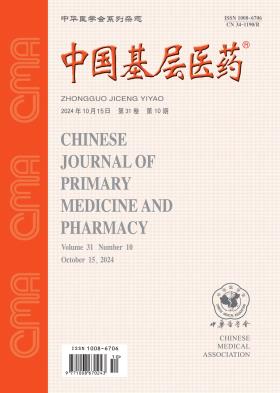Effect of prolonged sedation with propofol and dexmedetomidine on acute gastrointestinal dysfunction injury and prognosis in ICU patients
引用次数: 0
Abstract
Objective To investigate the effect of prolonged sedation with propofol and dexmedetomidine on acute gastrointestinal dysfunction injury(AGI) and prognosis in intensive care unit(ICU) patients. Methods A prospective cohort study was conducted to collect 200 cases of mechanical ventilation patients admitted to ICU in the Second People's Hospital of Hefei, and the patients were divided into two groups according to the simple random grouping principle, with 100 cases in each group.The control group was given propofol sedation, and the research group was given propofol combined with dexmedetomidine sedation.Both two groups were given sufentanil for analgesia, and the basic clinical data of the patients were recorded, including age, gender, weight, BMI index, serum albumin levels, acute physiology and chronic health evaluation Ⅱ(APACHEⅡ) score, triglycerides (TG), total cholesterol (TC), alanine aminotransferase (ALT), aspartate aminotransferase (AST). On the 0th and 7th day after the use of sedatives, the intestinal singing score, cases of acute gastrointestinal dysfunction injury, cases of delirium, length of stay in the ICU and hospitalization costs, TG, TC, ALT and AST in the two groups were observed and compared. Results The TG, TC, ALT and AST levels were all increased in the two groups compared with those at the 0d, but the increase degree in the study group was lower than that in the control group, and the differences were statistically significant (t=3.87, 4.58, 5.26, 4.38, P=0.00, 0.00, 0.00, 0.00). A total of 85 patients in the control group developed AGI, and 70 patients in the study group developed AGI.The difference between the two groups was statistically significant (χ2=8.62, P=0.03), and the difference in intestinal sound score between the two groups was statistically significant (χ2=11.48, P=0.00). There were 13 delirium cases in the control group and 2 delirium cases in the study group, and the difference was statistically significant (χ2=11.83, P=0.00). There were no statistically significant differences in the length of hospital stay(t=1.64, P=0.10) and hospital expenses(t=1.28, P=0.20) between the two groups. Conclusion For ICU patients requiring long-term mechanical ventilation, dexmedetomidine can significantly reduce the incidence of delirium and the occurrence of AGI, especially for obese patients, the use of dexmedetomidine sedation has little impact on their liver function and blood lipid metabolism, and can significantly improve the prognosis. Key words: Drug therapy, combination; Deep sedation; Intensive care units; Critical illness; Respiration, artificial; Gastrointestinal dysfunction; Delirium; Propofol; Dexmedetomidine异丙酚和右美托咪定延长镇静对ICU患者急性胃肠功能障碍损伤及预后的影响
目的探讨丙泊酚和右美托咪定长期镇静对重症监护室(ICU)患者急性胃肠道功能障碍损伤(AGI)及预后的影响。方法对合肥市第二人民医院ICU收治的200例机械通气患者进行前瞻性队列研究,按照简单随机分组原则将患者分为两组,每组100例。对照组给予丙泊酚镇静,研究组给予丙泊酚联合右美托咪定镇静。两组均给予舒芬太尼镇痛,并记录患者的基本临床数据,包括年龄、性别、体重、BMI指数、血清白蛋白水平、急性生理和慢性健康评估Ⅱ(APACHEⅡ)评分、甘油三酯(TG)、总胆固醇(TC)、丙氨酸氨基转移酶(ALT)、天冬氨酸氨基转移酶。在使用镇静剂后第0天和第7天,观察并比较两组的肠道歌唱评分、急性胃肠功能障碍损伤例数、谵妄例数、ICU住院时间和住院费用、TG、TC、ALT和AST。结果两组TG、TC、ALT和AST水平均较0d时升高,但研究组的升高程度低于对照组,差异有统计学意义(t=3.87,4.58,5.26,4.38,P=0.00,0.00,0.00),研究组70例发生AGI,两组差异有统计学意义(χ2=8.62,P=0.03),两组肠鸣评分差异有统计学显著性(χ2=11.48,P=0.00)。对照组13例谵妄,研究组2例谵妄,两组住院时间(t=1.64,P=0.010)和住院费用(t=1.28,P=0.020)差异无统计学意义。结论对于需要长期机械通气的ICU患者,右美托咪定可显著降低谵妄的发生率和AGI的发生,特别是对于肥胖患者,使用右美托咪定镇静对其肝功能和血脂代谢影响较小,可显著改善预后。关键词:药物治疗,联合用药;深度镇静;重症监护室;危重症;人工呼吸;胃肠功能障碍;谵妄;异丙酚;右美托咪定
本文章由计算机程序翻译,如有差异,请以英文原文为准。
求助全文
约1分钟内获得全文
求助全文
来源期刊
CiteScore
0.10
自引率
0.00%
发文量
32251
期刊介绍:
Since its inception, the journal "Chinese Primary Medicine" has adhered to the development strategy of "based in China, serving the grassroots, and facing the world" as its publishing concept, reporting a large amount of the latest medical information at home and abroad, prospering the academic field of primary medicine, and is praised by readers as a medical encyclopedia that updates knowledge. It is a core journal in China's medical and health field, and its influence index (CI) ranks Q2 in China's academic journals in 2022. It was included in the American Chemical Abstracts in 2008, the World Health Organization Western Pacific Regional Medical Index (WPRIM) in 2009, and the Japan Science and Technology Agency Database (JST) and Scopus Database in 2018, and was included in the Wanfang Data-China Digital Journal Group and the China Academic Journal Comprehensive Evaluation Database.

 求助内容:
求助内容: 应助结果提醒方式:
应助结果提醒方式:


